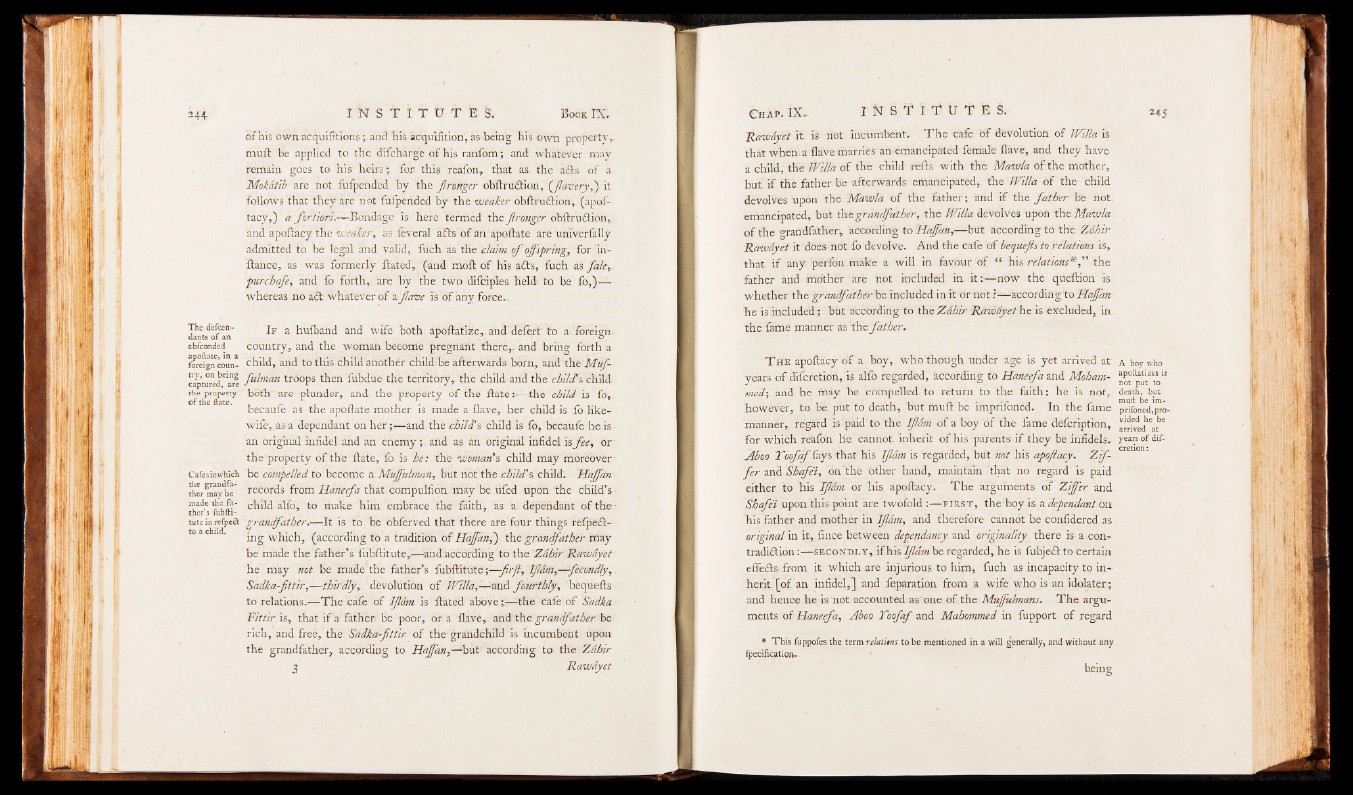
of his own acquifitions;, and Ms acquifition, as being His own property^,
muft be applied to the difcharge of his ranfom; and whatever may
remain goes to his heirs;, for this reafon, that as the afts of a
Mokatib are not fufpended by the fronger obflruftion, (Slavery,) it
follows that they are not fufpended by the weaker obflruftion,. (apof-
tacy,) a fortiori.— Bondage is-here termed the Jironger obflruftion,.
and apoflacy the weaker, as feveral afts of an apoftate are univerfally
admitted to Ire legal and valid, fuch as the claim o f offspring, for in-
flance, as was formerly Hated, (and moft of his afts, fuch as fale,.
purchafe-, and fo forth, are .by the two difeiples held to be f o , ) ~
whereas no aft- whatever of afame is of any force..
Thedefcen- j F a hufband and wife both apoftatize,..and'defert to a foreign
dants o f an r r... , o
absconded country, and the woman beeome pregnant there,, and bring forth a
fore^gncoun- child, and to this child another child be afterwards born, and the Mufc^
ttu re d ^ e f u^man troops then fubdue the territory,, the child and the child’s child.
the property, both’ are plunder, and the property of the H a te—the child, is fb,
o f the date. , r , n , ■ , n becaule as the apoltate mother is made a Have, her child is fo likewife,.
as a dependant on her;— and the child % child is fo, becaule he is.
an original infidel, and an enemy;, and as an original infidel is fe e , or
the'property of the ftate, fo is he: the woman's child may moreover-
Cafesinwhich be compelled to become a Muffulman, but not the child’s child. Haffan.
ther may be records from Haneefa that compulfion. may be ufed upon the child’s -
ther't fobfti" child alfo,. to make him‘embrace the faith, as a dependant of the-
tute inrefpecl grandfather.— It is to be obferved that there are four things relpeft-
oa. ' ing which, (accordingtoa traditiono f Haffan,) the grandfather may
be made the father’ s’fubftitute,.— andaccordihg to the Zdhir Rawdyet
he may not be made the father’s fubftitute;—-frjl,Ifdm ,—-fecondly,.
Sadka-fttir,— thirdly, devolution of Willa,-—and fourthly, bequefts
to relations.— The cafe of I f dm is Hated above;— the cafe of Sadka
Fittir is, that if 'a father- be poor, or. a Have,, and the grandfather be
rich, and free, the Sadka-fttir. of the grandchild is incumbent upon
the grandfather, according to Haffan,—but' according to the Zdhir
3 Rawdyet
Rawdyet it. is not incumbent. T h e cafe of devolution of Willa is
that when.aflave marriés an emancipated female Have, and they have
a child, the Willa of the child rhfis with the Mawla of the mother,
but. if. the father be afterwards ■ emancipated, the Willa of the child
devolves upon the Mawla of the father; and if the father be not.
emancipated, but the grandfather, the Willa devolves upon the Mawla
of the grandfather, according to Haffan,— but according to the Zdhir
Rawdyet it does not fo'devolve. And the cafe of bequefs to relations is,
that if any perfon make a will in favour of “ his relations’* ,” the
father arid mother are not included in i t :— now the queftion is
whether the grandfather'be included in it or not ?— àccûrding’to Haffan
he is-included ; but according to the Zdhir Rawdyet he is excluded, in
the fame manner as the father.
T he apoflacy of a. boy,, who though under age is yet arrived at a boy who
years of difcretion, is alfo regarded, according to Haneefa and Moham-
med-, and he may be compelled to return to the faith; he is not,, death, but
however, to be put to death, but mufl be imprifoned. In the fame prifoned,promanner,.
regard is paid to the I f dm of a boy of the fame defeription, vJritd<at>e
for which rerifon He. cannot, inherit of his -parërits if they be infidels, years of dif-
Aboo Toofaf fays that his I f am is regardéd, but not his apoflacy. Z if-
fe r and Shqfeï, on’the other hand, maintain that no regard is paid
either to his I f dm or his apoflacy. The argurnénts of Ziffer: and
Shcfei upon.this point are twofold :— f ir s t , the‘boy is a dependant on
his father and mother in I f dm, and therefore cannot be confidered as
original its it, fince between dependancy and originality there is a .com
tradiftion:— se condly , îfhis Ifdrn be regarded, he isfubjeftto certain
effefts from it which are injurious to him, fuch as incapacity to inherit
[of an infidel,] and feparation from a wife who is an idolater-;
and hence he is not accounted as’ one of the Muffuhnans. The arguments
of Haneefa, Aboo Toofaf and Mahommed in fupport of regard
* T h is fuppofes the term rdatum to. be. mentioned in a will generally, and without any
fpedfication.
being